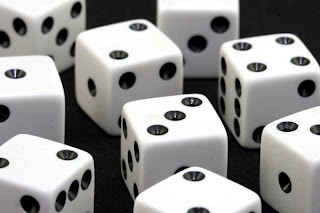Six sides of dice, and mature engagement with reality

Dice are familiar objects, right? Little cubes that fit in your hand, numbered one through six with decorative dots.
Think about one of them. One die, strange as the singular name seems. Which of its six sides is most important? Which of the six numbers is most important?
Well, it really depends on the game, right? And without the context of some particular game, no side is more nor less important than the others. All six sides are facets of the whole object. Dice wouldn't be dice without all six sides.
People sometimes ask me what I think is the most important aspect of sustainability. What's the most important problem? What's the most urgent? What's the one thing that worries me most?
Like identifying the most important side of a die, the answer varies. My answers to such questions vary from day to day, from conversation to conversation, depending upon the context. But there are some recurring themes.
When I try to explain the recurring themes I sometimes suggest a visual metaphor. So far, the best visual metaphor I've found comes from those six sides of dice.
So here's a list of things I consider crucial to achieve a sustainable culture. Like the sides of dice, these are all facets of a whole. No one of them is necessarily more nor less important than the others. They're all related. I won't number them nor rank them. I just list them in some order that seems convenient and flows, like this...
- empathy
- ability to perceive harm
(even subtle harm) - ability to anticipate consequences
(outcomes both good and bad) - maturity
(regardless of birthdays) - healthy engagement with the real universe around us
- ability to learn
(especially from mistakes and unexpected outcomes)
Conservation is important. Recycling is important. Economic justice is important. Of course!
But all of those important things result from our human interactions: our human interactions with each other, and our human interactions with the real universe that surrounds us.
Sustainability is about attitude. Sustainability is about culture. Sustainability is about empathy, and maturity, and the ability to perceive harm in all its forms. Sustainability is about anticipating consequences. Sustainability is about anticipating harm. Sustainability is about learning from our mistakes. Sustainability is about seeing the real universe and engaging reality as healthy grown-ups.
Sustainability is about all of those things, and a lot more. But that seems a good start.
---
In his own way, Professor George Mobus addresses many of these sides of the dice at his blog, Question Everything.
Photo courtesy of Designs by Darren.
